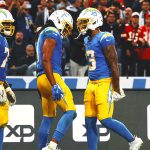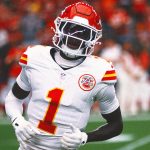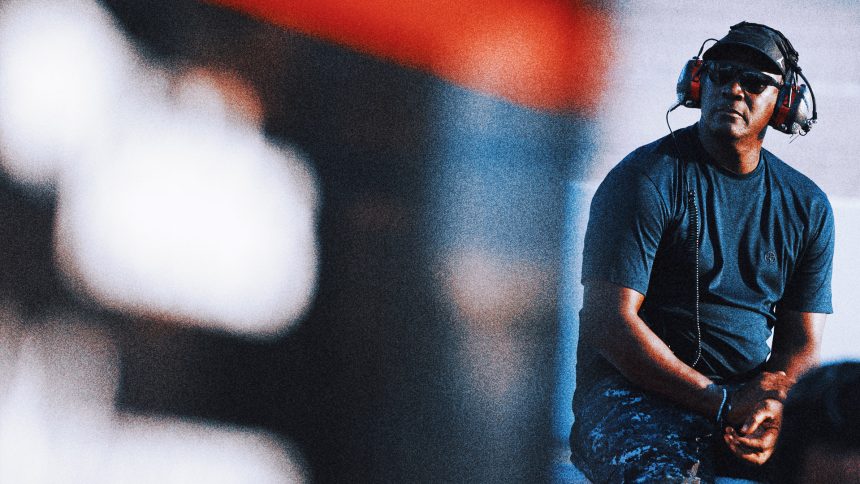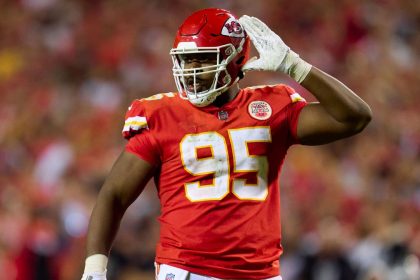HAMPTON, Ga. — Co-owned by basketball icon Michael Jordan and NASCAR driver Denny Hamlin, 23XI Racing confirmed that it did not sign NASCAR’s proposed charter agreement that most teams have signed Friday night.
Front Row Motorsports, owned by restaurant operator Bob Jenkins, also has not signed, according to sources.
The teams and NASCAR have been negotiating for two years, and, according to industry sources, teams were then told Friday night that if they didn’t sign the latest proposal that night, they could risk losing the charter for 2025.
“23XI decided to not meet a NASCAR-imposed deadline last night to sign Charter agreements for its two cars for 2025-2031,” the team ownership said in a statement. “23XI’s position, as stated in a letter to NASCAR, is that we did not have an opportunity to fairly bargain for a new Charter contract.
ADVERTISEMENT
“We notified NASCAR what issues needed to be addressed, in writing, at the deadline. We are interested in engaging in constructive discussions with NASCAR to address these issues and move forward in a way that comes to a fair resolution, while strengthening the sport we all love.”
What happens if they don’t sign isn’t totally clear, whether NASCAR would take the charters and sell them or hold them to see if those teams sign. Both 23XI and Front Row each have two charters currently with both expecting to obtain one of Stewart-Haas Racing charter’s after this season.
Former Cup champion Brad Keselowski, who drives for and co-owns RFK Racing, indicated that he wouldn’t characterize it as the teams were forced to sign the deal.
“For us, we felt like it was right to do a deal and move forward,” Keselowski said during his required at-track media availability session Saturday at Atlanta Motor Speedway. “I don’t necessarily know where [an ultimatum] is coming from. ‘Forced’ is a really strong term.
“But we are getting to a spot where it’s important to get these things settled.”
Hamlin referred most questions to the 23XI Racing statement. He said the team could field teams without a charter but it would be tough economically.
“I don’t really have anything else for you,” Hamlin said. “I wish I could or would, but not today.”
NASCAR officials would not confirm that all but two teams have signed the new agreement.
“At 23XI Racing, we remain committed to competing at the highest level while also standing firm in our belief that NASCAR should be governed by fair and equitable practices,” the team said in its statement.
Teams have argued they deserve a bigger percentage of the television rights deal, a reported $1.1 billion per year deal announced in November 2023 that runs from 2025-2031 with FOX, NBC, Amazon, Warner Bros. and TNT Sports (and CW for the Xfinity Series). Under the previous deal, teams were paid 25 percent of the television revenue through the race purse, while NASCAR took 10 percent and the tracks (more than half the tracks are owned by NASCAR) getting 65 percent.
Sources have indicated teams are getting a greater portion of that money as part of the new deal (about 35-40 percent) but also gave up rights in other areas that could generate revenue.
“We’re glad that the economics are improved to go with the media landscape that moved,” Keselowski said. “Right now, the sport moves around the media rights deal.”
The teams also wanted permanent charters but NASCAR executives scoffed at that request. The new agreement aligns with the current television agreement through 2031.
A charter is NASCAR’s version of a franchise, but it doesn’t give team owners as much say in the direction of the sport. It guarantees a starting spot in the field every week and a guaranteed payout based on racing each week as well as past years’ performance and championships won. It also lists the payouts for each position in a race so teams can estimate income to help secure investors or loans.
There are 36 charters and those who attempt to compete without a charter – typically called “open” cars – earn less than a third of what a charter team makes for coming to a race. With the current Cup race field a maximum of 40 cars, there currently are four spots available each week for open cars to attempt to qualify for the race.
The structure leaves the teams, who have contracts with drivers and sponsors to compete, seeing their business model significantly change if they do not have a charter to be even more reliant on sponsorship, which is more than half the revenue (and sometimes closer to 70 percent of the revenue) to some NASCAR teams.
“There’s a lot of comparisons between NASCAR and the other sports leagues,” Keselowski said. “This industry is looking over its shoulder at the NFL, NBA and so forth and seeing their situation dramatically improve, and we all want the same.’
Bubba Wallace, who drives for 23XI Racing, indicated that the charter negotiations have impacted his ability to sign for 2025.
“That’s what we’re waiting on,” Wallace said Saturday morning at Atlanta Motor Speedway.
Wallace is expected to return to 23XI, and Hamlin acknowledged the impact of the uncertainty of the charter agreement.
“Anything in the future is dependent on things like that [charter agreement],” Hamlin said.
Bob Pockrass covers NASCAR for FOX Sports. He has spent decades covering motorsports, including over 30 Daytona 500s, with stints at ESPN, Sporting News, NASCAR Scene magazine and The (Daytona Beach) News-Journal. Follow him on Twitter @bobpockrass.
recommended
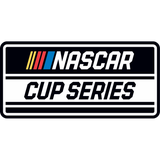
Get more from NASCAR Cup Series Follow your favorites to get information about games, news and more

